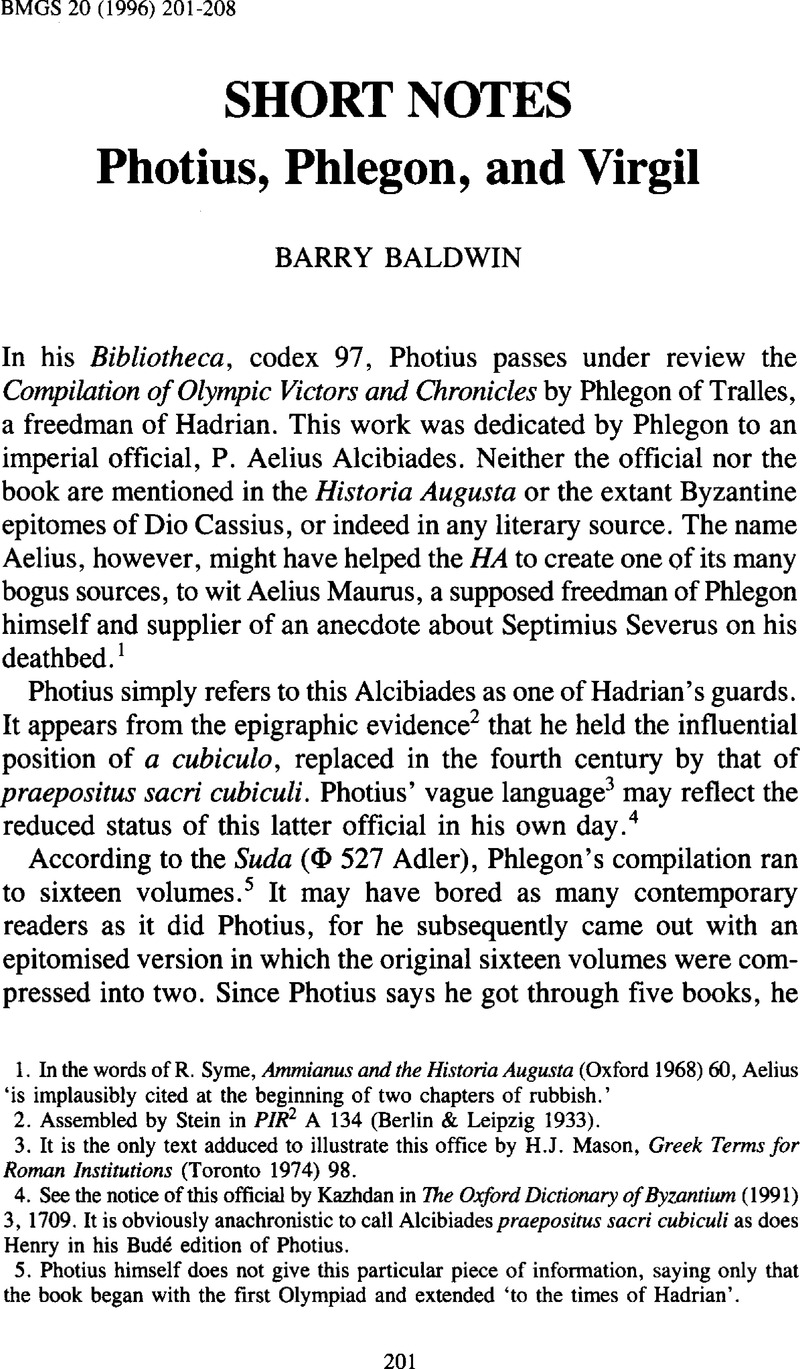No CrossRef data available.
Published online by Cambridge University Press: 22 January 2016

1. In the words of Syme, R., Ammianus and the Historia Augusta (Oxford 1968) 60 Google Scholar, Aelius ‘is implausibly cited at the beginning of two chapters of rubbish.’
2. Assembled by Stein in PIR2 A 134 (Berlin & Leipzig 1933).
3. It is the only text adduced to illustrate this office by Mason, H.J., Greek Terms for Roman Institutions (Toronto 1974) 98 Google Scholar.
4. See the notice of this official by Kazhdan, in The Oxford Dictionary of Byzantium (1991) 3, 1709 Google Scholar. It is obviously anachronistic to call Alcibiades praepositus sacri cubiculi as does Henry in his Bude edition of Photius.
5. Photius himself does not give this particular piece of information, saying only that the book began with the first Olympiad and extended ‘to the times of Hadrian’.
6. Treadgold, W., The Nature of the Bibliotheca of Photius (Washington, D.C. 1980) 101 Google Scholar, suggesting in a concomitant note that Photius may have had an incomplete manuscript, an unlikely proposition. Cf.Mango, C., ‘Books in the Byzantine Empire, AD 750-850’, in Byzantine Books and Bookmen (Washington, D.C. 1975) 39 Google Scholar; Wilson, N.G., Photius: The Bibliotheca (London 1994) 18 Google Scholar. It is also misleading of Schamp, J. in his volume of indexes (Paris 1991)Google Scholar to Henry’s Bude to restrict (455) Phlegon’s book to five volumes.
7. Hadr. 16. 1.
8. Firmus 8. 1-10.
9. Loc. cit.
10. HA, Hadr. 14. 8-16. 11. Cf.Wallace-Hadrill, A., Suetonius: The Scholar and his Caesars (London & New Haven 1983) 43–9 Google Scholar, where this possibility is not pursued and Phlegon is not mentioned.
11. See on this Jones, C.P., Plutarch and Rome (Oxford 1971) 40 Google Scholar.
12. Cimon 2. 3.
13. Though see the reasoned remarks of Wilson, , op. cit., 12 Google Scholar, and my own defence of Photius’ taste in a review article based on Wilson’s book in a forthcoming issue of EMC/CV.
14. Phlegon also wrote about people who reached a great age, the subject of a pamphlet ascribed to Lucian in the same or the next generation; cf.Baldwin, B., Studies in Lucian (Toronto 1973) 25 Google Scholar.
15. Wilson, , op. cit., 136 Google Scholar n. 1, expresses surprise that a Christian writer (in this case, Eunomius) should have reckoned by Olympiads. Still, the point should not be pressed too far: Olympiads are ubiquitous in, e.g., the Paschal Chronicle.
16. Bibl., codices 241 (Anaxagoras predicts rain before Olympic Games) and 279 (Helladius on the foundations of the major Greek festivals).
17. This is not the place for a lengthy analysis, but it can briefly be stated that the items from Phlegon are frequently at odds with the version in Plutarch’s life of Lucullus.
18. Phlegon’s figure differs from the Perioche of Livy 98, where one manuscript gives 950.000, the rest a round 900.000. Cf.Brunt, P.A., Italian Manpower 225 BC-AD 14 (Oxford 1971) 94 Google Scholar.
19. Amphilochia 242, 1. 5. 5. 7; cf.Westerink’s, L.G. index volume (Leipzig 1988)Google Scholar to the Teubner edition.
20. The word is a good deal more frequent in papyri than the léxica disclose; cf. the repertory of references in Daris, S., ‘Il lessico latino nella lingua greca d’Egitto,’ Aegyptus 40 (1960), 202–3 Google Scholar.
21. Scholars of Byzantium (London & Baltimore 1983) 115.
22. Not, however, John Lydus in the relevant section (4. 141) of his De Mensibus.
23. hoc. cit.
24. Photius has duals at Amph. 42, 124 and 78, 75; cf. LSJ on their relative infrequency.
25. On the evidence of Lampe, the latter term (not registered in this sense in LSJ) is commoner than the former in patristic Greek.
26. See below for Virgil’s editors. On the Byzantine side, see (e.g.) Wilson, , Scholars of Byzantium 115 Google Scholar, who analyses this Amphilochian passage, drawing attention to the matter of Euripides’ Lamia but without a word on the Virgilian item.
27. These spellings of the proper names reflect those of Photius; the same procedure is followed below when citing the cognate texts.
28. For full discussion of Virgil in Dio, Lydus, and Malaias, cf.Baldwin, B., ‘Virgil in Byzantium’, A&A 28 (1982) 81–8 Google ScholarPubMed; ‘Dio Cassius and John Malaias: Two Ancient Readings of Virgil’, Emérita 55 (1987) 85-6.
29. In his commentary (Oxford 1977) on Book Six.
30. This point is not pursued by Ogilvie, R.M., The Library of Lactantius (Oxford 1978) 51 Google Scholar, nor by any of the older commentators whose notes are reproduced in Migne, PL 6, cols. 141-4.
31. Ed. Geffcken, J. (Leipzig 1902; repr. Leipzig 1967) prol. 29–50 Google Scholar. For the role of the Sibylline Oracles in Byzantine literature and thought, see the notice of them by Kazhdan, and Trombley, in The Oxford Dictionary of Byzantium 3, 1890–1 Google Scholar.
32. Scholia Platonica, ed. Greene, G.C. (Haverford 1938) 79–80 Google Scholar.
33. P. 211 Bonn = Migne, PG92.1, col. 288b; this item is not in the admirable annotated translation, which starts in a later section, by Michael and Mary Whitby (Liverpool 1989).
34. Likewise, regarding Euripides’ Lamia, an equally derivative notice, we may compare the lengthy extracts in Bibliotheca, codex 190, from Ptolemy Chennos which include a tradition, denoted in Henry’s Budé as unique, that Cicero was murdered while reading the Medea.
35. Wilson, SB 115, suggests only John Lydus, clearly too limited and, on the evidence of the texts here presented, on the wrong track.
36. It is the same, we might add, with such as John Lydus. The extent of his knowledge of Latin has been much debated — see most recently Maas, M., John Lydus and the Roman Past (London & New York 1992) 30–32 Google Scholar — but again, what counts is his choice of names to drop: showing off is pointless if the intended audience cannot be trusted to appreciate what the author is boasting of.